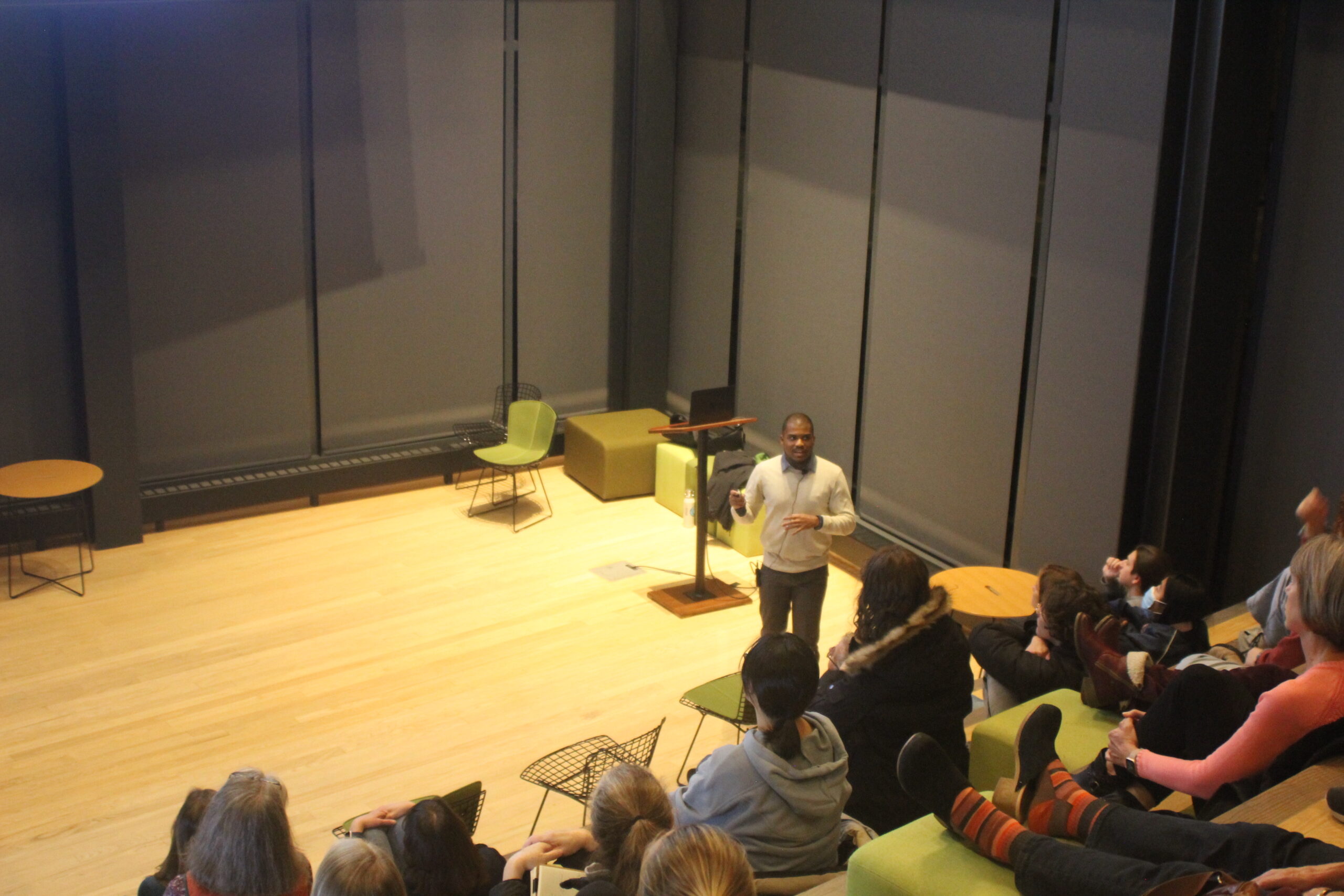Dr. Isaiah Bolden ’15 explores ancient chemical “clues” to inspire modern coral conservation techniques
November 18, 2022
 Carolina Weatherall
Carolina WeatherallOceanographer, biochemist and professor at the Georgia Institute of Technology, Dr. Isaiah Bolden ’15 studies ancient coral reefs to understand the effects of climate change on modern reef ecosystems. In his research, he uses a unique approach to coral conservation which he calls “forensic biogeochemistry” to track the health of coral reefs and predict trends using clues from fossilized coral caves, which he focused on in his talk on Monday.
“This talk is less ‘Coral Reefs and Climate Change: Featuring Some Caves’ and more ‘CSI: Featuring Corals and Caves,’” Bolden said.
Bolden holds a Bachelor of Arts degree in Earth and Oceanographic Studies from the College, and both a master’s and doctorate degree in Oceanography from the University of Washington. After growing up in the land-locked city of Nashville, Tenn., Bolden was first able to explore oceanographic sciences at Bowdoin, where he discovered his passion for studying coral reefs.
“I was far away from any ocean—let alone a coral reef—but I was really interested in exploring climate change,” Bolden said. “While we didn’t have oceanography related to climate change, we did have floods, and I really wanted to have a career that gave me some kind of essential toolkit for understanding why floods were getting worse.”
To begin the lecture, Bolden explained how ocean acidification and rising temperatures are resulting in a new stable state for reef ecosystems in which coral’s ecological niche collapses.
“We’re seeing a transition away from marine calcifiers like coral, which you can think of as the glue that holds the whole reef framework together,” Bolden said. “Now, reefs are becoming dominated by photosynthetic algae—organisms that don’t build calcium carbonate.”
In addition to disrupting the balance of marine ecosystems, widespread coral bleaching and a transition to an algae-dominated environment poses threats to benefits humans receive from coral, which Bolden refers to as ecosystem services.
“While it might be easier on the ears to think about coral reefs being in a state of transition to an alternative stable state rather than a decline away from something, modern coral-dominated reefs give us all these ecosystem services that we depend on,” Bolden said.
Some of these services include protection against storm surges, access to active ingredients used in several medicines, a foundation for the fishing industry and a vital ecotourism incentive in many regions.
Bolden described how using ratios of the elements calcium and strontium within aragonite, the coral’s structural backbone, allows scientists to better understand the impact of anthropogenic climate change on coral’s structural integrity. Tracking how these stressors are chemically altering coral, Bolden believes that researchers can develop a framework to predict coral responses to environmental stressors like ocean acidification.
When discussing his research experience in Curaçao working on cave terraces that display fossilized coral reefs dating back thousands of years, Bolden highlighted oceanographers’ ability to develop this story of shifting ocean conditions and coral stability across geological periods developed from the uptake of strontium or calcium.
“We’ve got some preliminary published data from nearby Bon Air from fossilized reefs that existed between zero and 10,000 years ago,” Bolden said. “We think that we have the potential to unlock a coral record in Curaçao that goes as far back as 30,000 years ago, covering from the Holocene to the last glacial period.”
Bolden explained the way that understanding ancient coral reef systems and the historical changes to their structural integrity under different environmental conditions can inspire conservation strategies tailored to the chemistry of individual reefs in the present. He elaborated that if coral is struggling to survive because the material that binds it to the reef is dissolving, building artificial reefs would be a more effective solution than transporting lab-grown corals into the ocean.
Having a comprehensive chemical understanding of what condition a reef is in, Bolden suggested, allows conservationists to enact the most well-informed strategies for coral reef conservation.
“There isn’t a cookie cutter, one-size-fits-all pathway to becoming a degraded or pristine reef,” Bolden said. “Not every reef is experiencing the same things, and so not every response should be the same.”
Anne T. and Robert M. Bass Professor of Natural Sciences Rachel Beane organized Bolden’s lecture with Bolden, and expressed admiration for the recent advances Bolden has made in coral and climate change research.
“I wanted to bring him here knowing that he could introduce the subject in a way that is accessible to people and that we could all learn more about corals, more about caves and more about the methods we use to study them,” Beane said.
Kellie Navarro ’23, a prospective coral reef biologist, was fascinated by Bolden’s biogeochemical approach to exploring climate change’s impacts on reefs.
“What I got most out of the talk was how important it is to tackle the climate crisis’ impacts on different ecosystems through interdisciplinary scientific work. We need all of these perspectives to find effective solutions to the degradation of marine ecosystems,” Navarro said.

Comments
Before submitting a comment, please review our comment policy. Some key points from the policy: